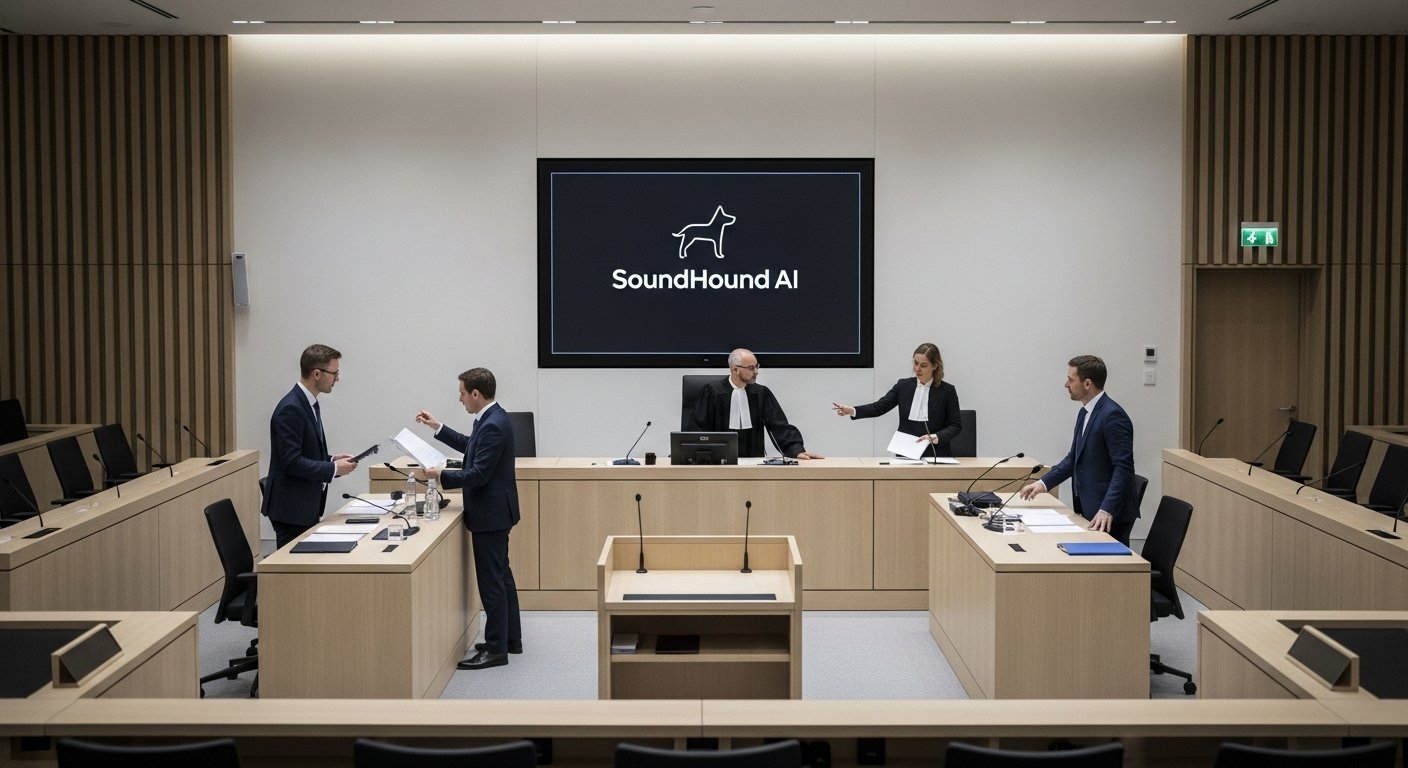If you purchased shares in SoundHound AI, Inc. (NASDAQ: SOUN) during the past year, you may be closely watching the developments around the SoundHound AI investor lawsuit. This legal action has raised serious questions about the company’s financial reporting, internal controls and disclosures — and for many investors, it’s a cautionary tale of how even tech companies riding the AI wave can still face fundamental accounting and governance issues.
In this article we’ll walk through: what the lawsuit alleges, how it arose, what the key facts and dates are, why it matters, and what you as an investor should keep in mind. Our aim is to provide a clear, human-friendly explanation of the situation so you can understand your exposure, your rights and what to watch next.
What is the SoundHound AI investor lawsuit?
The basic overview
The lawsuit against SoundHound AI is a class-action securities fraud case brought on behalf of investors who purchased or otherwise acquired the company’s securities between May 10, 2024 and March 3, 2025 (the “Class Period”).
According to the complaint, during that period the company and certain of its officers allegedly:
-
Had material weaknesses in its internal controls over financial reporting.
-
Over-stated the extent to which they had remediated those weaknesses (i.e., said they fixed them when they hadn’t).
-
Reported inflated goodwill following their acquisition of Amelia Holdings, Inc. (and perhaps other acquisitions) because of the control weakness.
-
Delayed filings of certain financial reports because of the complexity of accounting for acquisitions (e.g., SYNQ3 Restaurant Solutions, Inc. and Amelia).
-
As a result, the company’s public statements (about its business, operations and prospects) were allegedly materially false or misleading.
Who is suing and where
The case, captioned Liles v. SoundHound AI, Inc., is filed in the U.S. District Court for the Northern District of California. Multiple law firms are representing investor-plaintiffs and advertising the opportunity for shareholders to join the class or be appointed lead plaintiff.
Why did this lawsuit arise? What triggered it?
Background on the company’s situation
SoundHound AI is a company that provides conversational AI and voice-technology solutions. At the height of AI enthusiasm it attracted interest, but like many tech companies it also acquired other firms (such as Amelia and SYNQ3) and faced the challenges of integrating them and accounting for them properly.
In early March 2025 the company disclosed that it would delay its 2024 annual report (Form 10-K) because “due to the complexity of accounting for the SYNQ3 and Amelia acquisitions, the Company requires additional time to prepare financial statements and accompanying notes.” That disclosure was accompanied by the company’s admission that it had identified material weaknesses in its internal control over financial reporting.
What changed publicly & why that matters
When the market learned about the delay and weaknesses, the company’s stock price moved — and plaintiffs argue that this is when the truth began to emerge, causing investor losses. For example, one article noted that the stock fell nearly 15 % after those issues came to light.
In short: The lawsuit says the company misled investors by presenting itself as having stronger controls and more reliable reporting than was the case — and when the reality came out, investors lost money and are now seeking compensation.
Key allegations in the lawsuit (in depth)
Let’s dig into the major allegations in the SoundHound AI investor lawsuit.
1. Material weaknesses in internal controls
-
The complaint alleges that SoundHound had material weaknesses in its internal control over financial reporting (ICFR). That means that the company’s systems for ensuring accurate, timely, reliable financial statements were deficient.
-
Because of these weaknesses, the company allegedly could not fully and accurately account for its corporate acquisitions (e.g., recognizing goodwill, liabilities, integration costs) despite public statements to the contrary.
2. Overstating remediation / mis‐disclosing status
-
The company allegedly misled investors by overstating how far it had remedied such weaknesses — in other words, saying “we fixed it” or “we are on track” when the lawsuit says they were not.
-
That misstatement led investors to believe the business and accounting were more stable than they were.
3. Inflated goodwill from acquisitions
-
One specific allegation: After acquiring Amelia Holdings (in August 2024) and SYNQ3 (January 2024), SoundHound reportedly recognized a goodwill amount that was inflated because of the control weaknesses.
-
Goodwill is an intangible asset accounting for the premium paid over fair value in an acquisition; if improperly recorded it can overstate assets and hide liabilities.
4. Delays, extra costs, risk of non-timely filings
-
The lawsuit claims that because of the acquisition complexity plus the internal control issues, SoundHound faced extra time and expense to integrate acquisitions, increasing risk of delayed or late SEC filings.
-
Indeed, the company did announce a delay in filing its annual 10-K for 2024, citing precisely those acquisition complexities.
5. Misleading public statements
-
Putting all of the above together, the plaintiffs say that the company’s statements about its business and financial condition were false, lacked a basis and omitted the true condition.
-
When the truth was revealed (via the restatement, delays, or admissions), the stock dropped and investors suffered losses.
Timeline of events
| Date | Event | Significance |
|---|---|---|
| Jan 3 2024 | SoundHound acquired SYNQ3 | Increased acquisition workload and accounting complexity. |
| Aug 2024 | Acquisition of Amelia Holdings, Inc. | Significant acquisition leading to goodwill recognition. |
| March 4 2025 | SoundHound disclosed delay in filing 10-K, admitted material weaknesses | Triggered stock drop, set off legal claims. |
| May 2025 | Multiple law firms announce class action filings / deadlines for plaintiffs | Indicates litigation is underway. |
| May 27 2025 | Deadline for investors to apply to be lead plaintiff | Important procedural milestone. |
Who is involved (parties & their roles)
-
Plaintiffs: Investors who purchased SoundHound AI securities during the class period and claim they were misled.
-
Defendants: The company itself (SoundHound AI) plus certain officers and/or directors (as typical in securities litigation) alleged to have made or approved the misleading statements or omitted material information.
-
Courts & process: The case is in the U.S. District Court for the Northern District of California.
-
Law firms representing plaintiffs: Several, including The Rosen Law Firm, P.A., Levi & Korsinsky, LLP, Kessler Topaz Meltzer & Check, LLP, among others.
Why this matters — implications for investors and companies
For investors
-
If you bought SoundHound AI shares during the class period and lost money, you may be eligible to join the class and potentially recover some damages.
-
The lawsuit highlights the risk of investing in companies where internal controls and acquisition accounting may be weak — even in fast-growing sectors like AI.
-
It’s a reminder of the importance of exercising due diligence, even when companies are riding strong market trends.
For companies and the market
-
The case reinforces that high-growth companies with acquisitions must maintain strong governance, reliable financial reporting and transparent disclosures.
-
Failing to do so can lead to legal, regulatory and reputational consequences, which in turn can damage investor confidence.
-
The trend toward AI and emerging technologies does not nullify the fundamentals of financial controls and investor protection.
Real-Life Example: What happened in the market
Let’s look at a concrete scenario to illustrate how this played out.
In early March 2025, SoundHound publicly disclosed that it would delay its 2024 annual report (Form 10-K) because of the complexity of accounting for the SYNQ3 and Amelia acquisitions — and admitted material weaknesses in its internal controls. According to media reports, the stock price dropped nearly 15 % following the disclosure.
For an investor who bought shares at, say, $12 during late 2024, that drop represents a meaningful loss triggered by the disclosure of the problems. If that investor had bought during the class period, the lawsuit would allow them to join and potentially share in any recovery.
What are the possible outcomes?
-
The case could settle (the company may reach a settlement agreement with plaintiffs) or go to trial and potentially be decided by a judge or jury.
-
A settlement could lead to a compensation fund for eligible class members (after legal fees and court costs).
-
If the case proceeds to judgment and is successful, damages may be awarded (or the company may appeal).
-
Regardless of outcome, there may be non-monetary consequences: changes to company governance, disclosures, internal controls, or directors/officers liability.
What should shareholders do now?
If you believe you may be affected by the SoundHound AI investor lawsuit, here are suggested steps:
-
Confirm your purchase/trade dates – Check if you bought or acquired SoundHound AI securities between May 10, 2024 and March 3, 2025 (inclusive).
-
Check for losses – If you suffered a loss during that period, you may have a claim.
-
Consider joining the class – You can sign up with one of the law firms representing plaintiffs. There is typically no cost to you initially (fees come out of any recovery).
-
Watch deadlines – For example, May 27, 2025 was the deadline for lead plaintiff motions in many notices.
-
Monitor the case – Stay updated on developments, court filings, certifications of the class, settlement offers or trial dates.
-
Consult a legal or investment professional – If your losses are substantial or you’re unsure of your rights, professional advice is wise.
Conclusion
The SoundHound AI investor lawsuit serves as a strong reminder that even companies in high-flying sectors like artificial intelligence are not immune to fundamental accounting, governance and disclosure risks. For investors who held shares in SoundHound between May 10, 2024 and March 3, 2025 and experienced losses, this lawsuit may offer a path to seek recovery. For all participants in financial markets, it underlines the enduring importance of internal controls, transparent acquisitions, and credible disclosures.
If you’re one of the affected shareholders, consider the steps above to assert your rights. If you’re an investor watching similar companies, use this case as a learning opportunity: innovation and growth are important, but integrity in financial reporting remains critical.
FAQs
Q1. What exactly is the “class period” in the SoundHound AI investor lawsuit?
A. The class period is the time frame during which plaintiffs allege that the company’s misleading statements or omissions occurred — in this case, May 10, 2024 to March 3, 2025.
Q2. Do I automatically get compensated if I bought shares during that period?
A. Not automatically. You must join the class or be represented, and any compensation depends on how the case resolves (settlement or judgment). You do not have to be the lead plaintiff to receive a portion of any recovery.
Q3. Why is the company accused of inflating “goodwill”?
A. Because of alleged weaknesses in internal controls and acquisition accounting, plaintiffs claim the company recognized more goodwill (an intangible asset reflecting excess purchase price) than was justified — which may overstate the value of the acquired business and thus mislead investors.
Q4. What is a “material weakness” in internal controls?
A. A material weakness is a deficiency (or combination of deficiencies) in the company’s internal control over financial reporting such that there is a reasonable possibility that a material misstatement of the company’s annual or interim financial statements will not be prevented or detected on a timely basis. In this case, that’s one of the core allegations.
Q5. Should I take any action right now as an investor?
A. Yes — check if you fall within the class period, confirm your losses, and consider joining the lawsuit via one of the law firms representing plaintiffs. Even if you don’t lead the case, you can still participate in any recovery. Also monitor deadlines and stay informed about case developments.








Leave a Reply